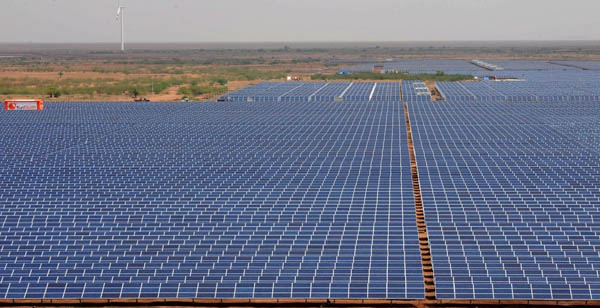By Siddharth Singh
- Prime Minister Narendra Modi along with French President François Hollande jointly launched the International Solar Alliance and pledged India’s assistance of USD 30 million (Rs 199 crore) for the initiative that brings together developed and developing countries. PM Modi said that India will provide land and contribute about USD 30 million to build the Secretariat infrastructure of the initiative and support its operation for the next five years.India has proposed an International Agency for Solar Technologies and Applications (INSTA) to bring together nearly 125 countries rich in solar resources that lie between tropics of Cancer and Capricorn, notable from Africa and Asia, to pursue this clean, perennial and sustainable source of energy. The Alliance is likely to boost the absorption and deployment of solar power, which has already seen exponential expansion in the last five years. It is an invitation to 121 countries lying between the Tropic of Cancer and the Tropic of Capricorn, which get the most solar insolation, to make collaborative efforts to harness solar energy to generate electricity. Most of these countries are in Asia, Africa and South America, and many of them are power deficient. By coming together to install solar power plants, these countries can drive up the demand for solar technologies manifold, in the process forcing down prices even more. Currently, the growth of solar installed capacity has been coming from very few countries. The grouping aims to raise US$400 million from member countries and multilateral agencies, such as the World Bank, to invest in solar power research and usage, address regulatory issues, and draft universal standards.
This is an alliance that brings together developed and developing countries, governments and industries, laboratories and institutions in a common enterprise. This initiative is a sunrise of new hope –- not just for clean energy, but for villages and homes still in darkness; and for mornings and evenings filled with a clear view of the glory of the sun because as the developing world lifts billions of people into prosperity, the hope for a sustainable planet rests on a bold global initiative. The advanced countries need to leave enough carbon space for developing countries to grow and that is what natural climate justice is all about.
Another objective of the Alliance is to bring standardisation to manufacturing processes and solar technologies. If every country starts using similar products and processes, costs of manufacturing elements of solar technologies can fall substantially. The fall in prices of solar power so far has been propelled mainly by rising demand. Analysts say prices haven’t bottomed out yet. It can easily go down further. Not just by demand but by technology innovations too. We have not seen enough research and development activities happening in the solar sector as of now, especially in the developing countries for their own use.
To highlight the importance of solar energy, Modi said that in Indian tradition, Sun is the source of all forms of energy. “As Rig Veda says, Sun God is the Soul of all beings, moving and non-moving. Many in India begin their day with a prayer to the Sun. Today, when the energy sources and excesses of our industrial age have put our planet in peril, the world must turn to Sun to power our future,” he said. The idea of solar alliance was mooted by Modi during the the India-Africa Forum Summit.
There is already a revolution in solar energy. Technology is evolving, costs are coming down and grid connectivity is improving. It is making the dream of universal access to clean energy has become more real. The Solar Alliance model, if it succeeds, can potentially be extended to other forms of renewable energy like wind or biogas. It can, in turn, foster south-south cooperation and bring transformational changes in providing affordable access to energy in poorer countries, and lift living standards.
(Siddharth Singh is Research Associate at SPMRF)
(The views expressed are the author's own and do not necessarily reflect the position of the organisation)

